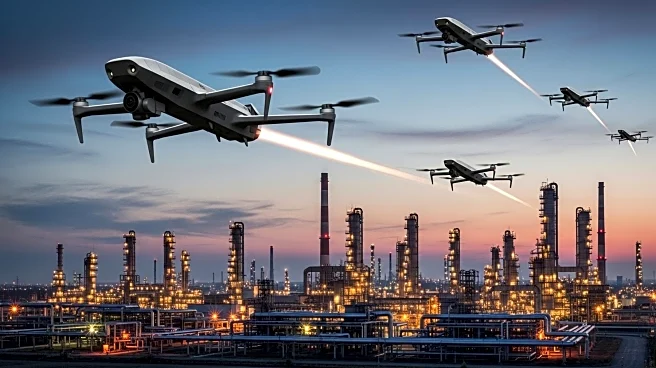What's Happening?
Ukraine has escalated its military strategy by targeting Russian oil refineries with drone strikes, as part of an ongoing energy conflict between the two nations. This development follows a period of intensified Russian attacks on Ukraine's energy infrastructure, including gas networks and power stations. Ukrainian drones recently struck the Gazprom Neftekhim Salavat oil refinery in Bashkortostan and the Volgograd refinery, causing significant damage. These actions are part of Ukraine's broader strategy to disrupt Russia's oil industry, which Ukrainian President Volodymyr Zelensky claims is crucial to limiting Russia's war capabilities. Despite these strikes, Russian officials maintain that their oil and gas industry remains unaffected.
Why It's Important?
The conflict between Ukraine and Russia over energy resources has significant implications for global energy markets and geopolitical stability. Ukraine's attacks on Russian oil refineries could potentially disrupt Russia's oil production, affecting global oil prices and supply chains. Additionally, these strikes may exacerbate existing gasoline shortages in Russia, impacting its economy and ability to sustain military operations. The ongoing energy conflict highlights the vulnerability of energy infrastructure in wartime and underscores the strategic importance of energy resources in modern conflicts.
What's Next?
As winter approaches, Ukraine faces the challenge of maintaining its energy infrastructure amid continued Russian attacks. Ukrainian officials are preparing for potential escalations in Russian strikes, particularly targeting gas installations crucial for heating. Ukraine's ability to sustain its drone campaign against Russian refineries will depend on its capacity to maintain the tempo and effectiveness of these operations. Meanwhile, Russia may intensify its retaliatory strikes, further complicating the energy security situation in Ukraine.
Beyond the Headlines
The energy conflict between Ukraine and Russia raises ethical and legal questions about the targeting of civilian infrastructure in warfare. The destruction of energy facilities not only impacts military capabilities but also affects civilian populations, potentially leading to humanitarian crises. This situation underscores the need for international dialogue on the protection of critical infrastructure during conflicts and the broader implications for global energy security.









